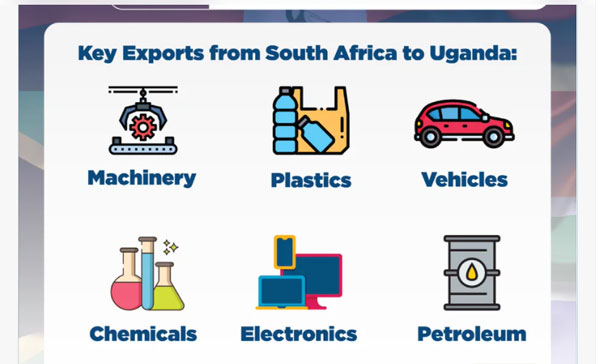
Kampala, Uganda | THE INDEPENDENT | The private sector leaders in Uganda and South Africa have called on the two governments to work towards removal of all non-tariff barriers to trade between the countries, including travel visa restrictions.
This comes amidst a continuously highly imbalanced trade position, with South Africa exporting to Uganda goods worth billions of dollars while Uganda’s exports to the south are just worth a few hundred millions, according to available figures.
Ebenezer Asante, Senior Vice President at MTN Group launched the challenge at the start of the Uganda South Africa Trade and Investment Forum at Speke Resort Munyonyo, where he hailed the private sector’s resilience in the midst of recent economic shocks.
Asante challenged the government to improve the business environment so that his country’s investments in Uganda can fully benefit the people to build “the Uganda we want”, adding that the people have played their part by proving the hunger to work.
South African investments in Uganda include commercial banks, telecommunications, Broadcasting, Manufacturing transportation among others.
Odrek Rwabwogo, the chairperson, Presidential Advisory Committee in Exports and Industrial Development expressed concern that deals that were sealed at previous summit in South Africa have not been implemented to date, including setting up a mobile phone plant.
He said it was time for the two countries to remove all bottlenecks that are hindering the smooth flow of investments between the two.
He wondered for example, why South Africa which is a net importer and a high consuming community of coffee, continues to import the commodity from overseas when Uganda has all the coffee they need.
Rwabwogo, a commercial farmer in Uganda also blamed the South African government for delaying on their part, to appoint a trade representative in Uganda for easing trade concerns.
On the part so far played by Uganda, Rwabwogo revealed that the government had set aside 350 million dollars (about 1.3 trillion shillings) for a fund to support trade and investment with South Africa.
The concerns by Ugandans were repeated by Paul Amoru, Uganda’s High Commissioner to South Africa and Southern African states who called for the expeditious conclusion of visa-free travel between the two countries.
According to the embassy, there are currently about 1 million Ugandans in southern Africa.
Ambassador Amoru said a comprehensive solution should be reached and communicated to the concerned in a few months.
In her response to the concerns about travel restrictions, South Africa’s High Commissioner to Kampala, Lulama Xinguana said there was no cause for concern about the absence of an agreement on the travel visa.
She admitted that for people seeking for employment opportunities in South Africa it is a bit hard getting a visa, but not for businesspeople.
On proof of a business seeking to invest in or export to the country, she said, a visa is granted by the embassy easily, while some have been granted long-term multiple visas allowing them to freely conduct business.
She revealed that the Department of Home Affairs officials have been in Uganda for four days in talks with the officials at Ugandan ministry of internal affairs over the visa requirements between the two countries.
Ambassador Xinguana assured Ugandans that her country is ready to import Ugandan coffee and other agricultural commodities.
However, the challenge will be meeting the sanitary and phytosanitary requirements as animal and plant health remains vital to the country.
Earlier this year, South Africa’s President Cyril Ramaphosa tasked the governments to find out why his country’s investments in Uganda had dropped by more than half to just 32 in two years.
The Deputy Minister for Trade, Industry and Economic Development, Nomalungelo Gina told the summit that even trade had dropped especially the export revenues to Uganda, though Uganda’s exports grew marginally.
Rwabwogo said a study done after Ramaphosa’s call found that the cost logistics and transport, then inability by Ugandan companies to sustain supply of raw materials and unreliability of internet services among others were frustrating investments.
****
URN
 The Independent Uganda: You get the Truth we Pay the Price
The Independent Uganda: You get the Truth we Pay the Price



